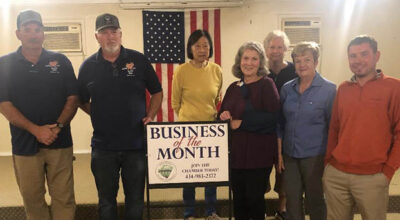Environmentalists applaud greener laws
Published 7:37 am Thursday, May 20, 2021
|
Getting your Trinity Audio player ready...
|
By Veronica Campbell
Capital News Service
New legislation in Virginia will soon give some power to local governments and help environmental organizations and businesses combat plastic pollution.
Jim Deppe is an advocacy coordinator for Lynnhaven River Now, an organization that believes in restoring and protecting Virginia’s waterways. Deppe also coordinates the Virginia Coastal Alliance, which comprises 17 organizations in Virginia that focus on off-shore drilling and single-use plastics.
“Bags, polystyrene and balloons are all significant problems in the marine environment,” Deppe said. “Two years ago, there was no option for municipalities to put laws in place locally that would allow the elimination of plastic bags, polystyrene and balloons.”
That’s because traditionally, Virginia is a Dillon Rule state. That means municipalities or cities are limited to the powers expressly granted to them by the state. Organizations such as Lynnhaven River Now and the Surfrider Foundation, another nonprofit environmental organization, successfully lobbied in 2020 to allow local municipalities to implement ordinances against plastic bag usage by requiring a small fee.
House Bill 2159, introduced by Del. Nancy Guy, D-Virginia Beach, is one of the most important bills of the year to combat plastic pollution in Virginia, according to environmentalists. The law prohibits anyone over the age of 16 from intentionally releasing non-biodegradable balloons outdoors.
Anyone caught releasing balloons could face a civil penalty of $25 per balloon. The current law prohibits the release of 50 balloons or more within an hour. The civil penalty is currently $5 and proceeds are deposited into the Lifetime Hunting and Fishing Endowment Fund. The new law will put any penalty money into the Game Protection Fund. The bill was signed by Gov. Ralph Northam.
Morgan Wilds is the vice chair for the Virginia chapter of the Surfrider Foundation. The organization was founded 36 years ago with the mission of protecting the world’s oceans and beaches.
Wilds said the ban on balloon releases, and the ensuing penalty, will hopefully deter people from releasing them.
“Virginia is a blue state, but it is still very much purple,” Wilds said. “Environmental issues have a long road ahead of them in the commonwealth.”
Another significant piece of environmental legislation passed by the General Assembly this year was the ban on polystyrene packaging commonly used in carryout. The ban goes into effect for larger chain restaurants in 2023 and then statewide in 2025.
Northam signed an executive order in March to help reduce single-use plastics at all executive branch state agencies and state higher education institutions. State agencies have 120 days to discontinue, with some exemptions, buying, selling or distributing items such as disposable plastic bags, single-use plastic and polystyrene food service containers, plastic straws and cutlery and single-use plastic water bottles.
“We’ve been fighting on it for a few years,” Wilds said about the polystyrene legislation.
Katie Register is the executive director of the Clean Virginia Waterways program of Longwood University and has worked to combat plastic pollution. She organizes the International Coastal Cleanup in Virginia and collects data on what types of litter are in the environment.
The top 10 contributors to plastic waste come from restaurants and convenience stores and include straws, lids, cups and beverage bottles, according to the Clean Virginia Waterways website.
On the local level, some restaurants in Virginia Beach have already gotten a head start on using sustainable packaging before the polystyrene ban takes effect.
“They [the Surfrider Foundation] came to us three years ago,” said Patrick Edwards, owner of The Stockpot, an environmentally conscious restaurant located at 700 19th St. in Virginia Beach.
The Surfrider Foundation told Edwards that he would need to meet their requirements if he wanted to be a part of the Ocean Friendly Restaurants program, an initiative to stop plastic from entering oceans.
Restaurant owners who want to participate follow outlined criteria that bans use of polystyrene, plastic bags and straws, and calls for reusable foodware on-site and proper recycling practices, according to the Surfrider Foundation’s website.
“We already met all of those criteria because it’s something that we felt was important to us in the first place,” Edwards said. “So that was really a win-win for us.”
Owners participating in the program are listed on the Surfrider Foundation’s national and chapter websites and get marketing collateral such as window stickers, brochures and bill inserts to show and educate customers. Members also get a tax-deductible donation opportunity.
Edwards said he stopped using plastic straws and didn’t get the feedback he wanted for being an environmentally conscious restaurant.
“People are very dependent on certain plastic things,” Edwards said. “When we made changes to our straws, we got a huge backlash. You would think everyone would be on board.”
Register hopes that her nonprofit won’t have to focus on cleaning the environment.
“I would like to see us spend more time in the world of prevention, preventing this debris in the first place,” she said. “It’s a matter of resources, but it’s also a matter of political will.”




